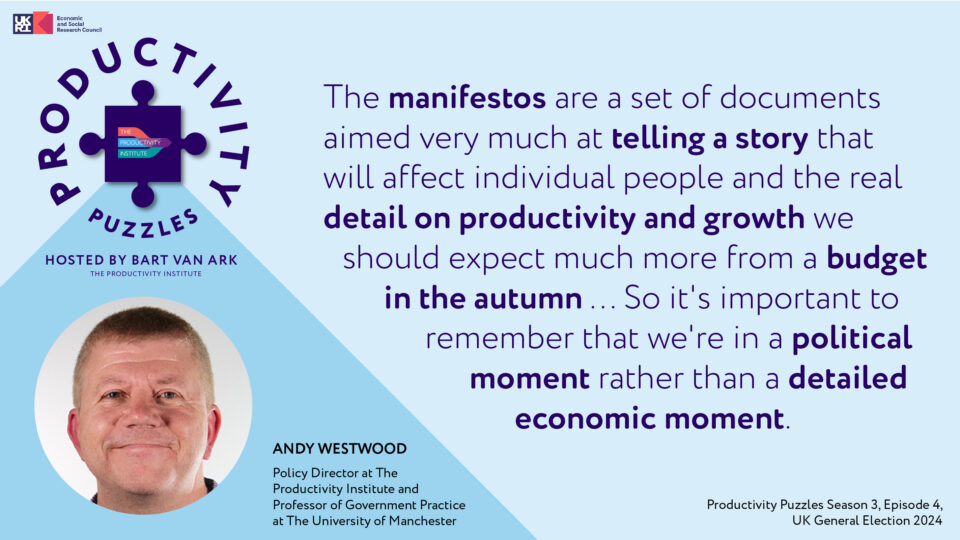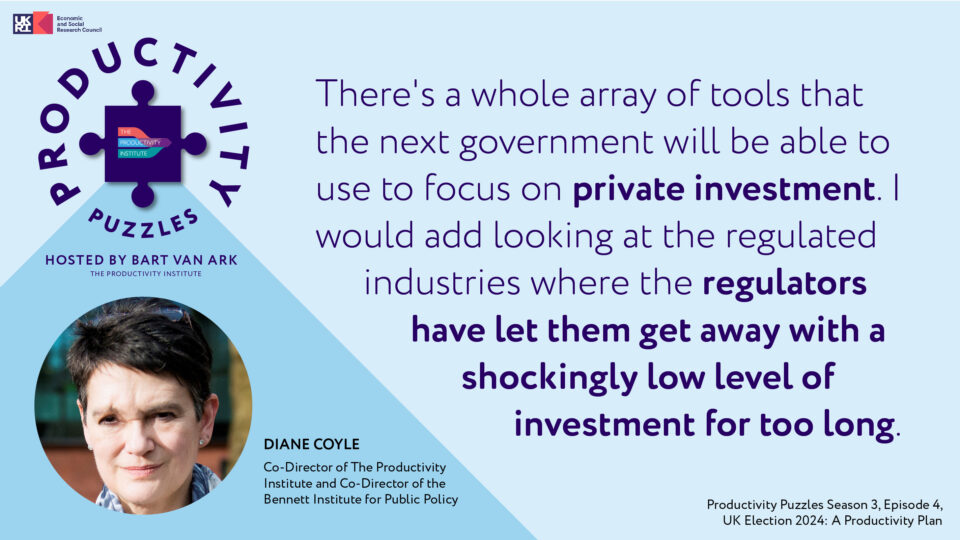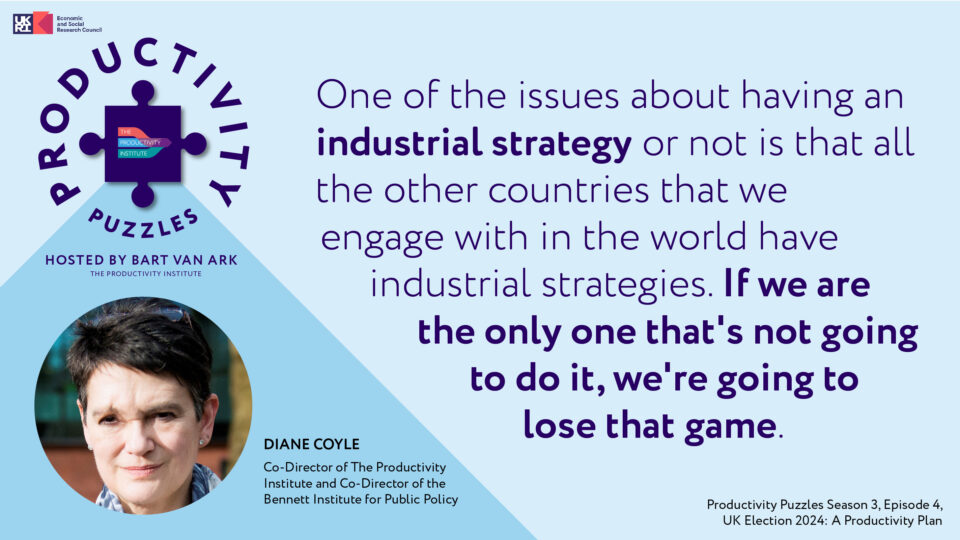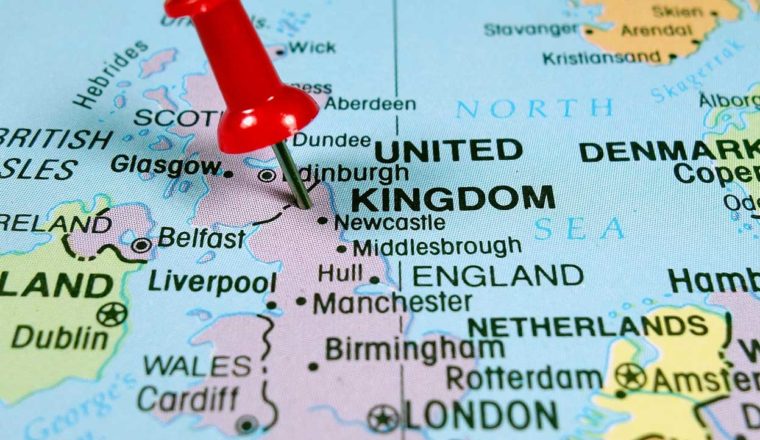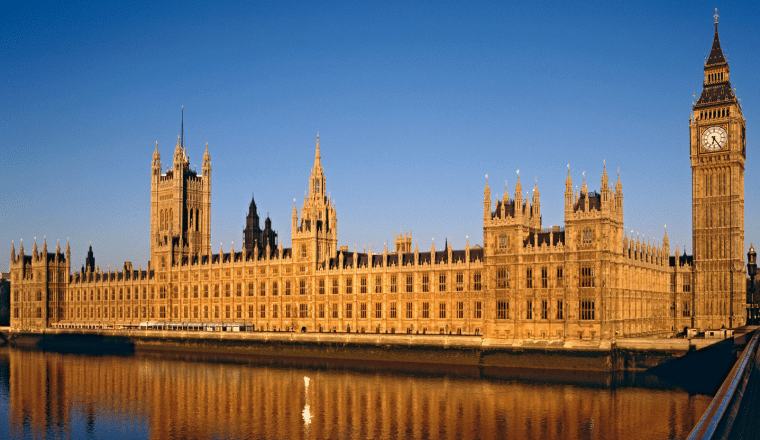General Election: how to implement pro-productivity policies and an industrial strategy
The election manifestos published in the second week of June 2024 sparsely recognise the importance of productivity. It may not be the most glamorous topic for voters but for any incoming government, productivity will need to run through the core of the policy agenda in the coming years.
The latest episode from The Productivity Institute’s Productivity Puzzles podcast series focuses on the UK General Election and The Productivity Institute’s key policies for the next UK Government focused on productivity.
Host Bart van Ark is joined by:
- Sir Anton Muscatelli, Principal and Vice-Chancellor of the University of Glasgow.
- Dame Diane Coyle, Co-director of the Bennett Institute for Public Policy at the University of Cambridge, and Co-Director of The Productivity Institute.
- Andy Westwood, Policy Director at The Productivity Institute and Professor of Government Practice at The University of Manchester.
Pro-productivity policies and the party manifestos
Labour productivity, measured as Gross Domestic Product per hour worked, is currently on a slow growth trajectory of about 0.5 percent. To match the growth of the economy during the 2010s, productivity growth needs to be doubled to 1 percent. However, for the UK to afford much-needed public investments in the economy without having to raise taxes dramatically, productivity growth will need to climb to 1.5 to 2 percent. This is achievable, as the UK demonstrated during much of the 1980s, 1990s, and early 2000s.
There are a number of challenges to be faced, but The Productivity Institute’s Productivity Agenda and Election 2024 report identify three main issues that need to be addressed:
- Countering the chronic underinvestment in business investment which has been weakening since the mid-1990s.
- Where businesses, cities and regions are excelling at productivity, there needs to be greater sharing of best practices. Outside of London, cities need to share the benefits of their growth with their surrounding areas.
- Britain needs to find a solution to its two-tiered system of a highly centralised government in Westminster and Whitehall and the huge fragmentation at the devolved national, regional, city, and town level. This results in a lack of joined-up policies.
In the podcast, the guests examine the manifestos of the Conservative Party, Liberal Democrats, and Labour Party through the lens of productivity, identifying the differing depths and specifies of their policies. For a deeper look at how the party manifestos stack up against the top pro-productivity policies, read The Productivity Institute’s Election 2024 report.
Getting investment going
Increased investment, both public and private, is needed to drive productivity growth. This must be underpinned by a credible fiscal rule and a fiscal plan for public investment, allowing for spending on necessary infrastructure and services without compromising economic stability. It is critical to understand the returns of public investment for private sector productivity; increased public sector investment has the effect of crowding in and leads to greater private sector investment.
Innovation, skills and industrial strategy
The podcast discussion stresses the necessity for better coordination between different levels of government and the importance of local initiatives in driving productivity. A systematic approach to local growth deals that includes devolved nations and English regions is an important component of this coordinated approach to innovation and skills policy.
An integrated industrial strategy that combines central with regional government action and harnesses place-based assets is critical to more targeted public investment, which can unlock greater business investment. Such a strategy is also crucial for leveraging the UK’s strengths in technology and research, addressing the mismatch between skills supply and demand, and fostering an environment where businesses and regions can excel. This type of long-term thinking has to be implemented into missions to address major transitions, such as the move to net zero.
Planning and infrastructure
The UK’s planning system and infrastructure is also discussed, with the importance of a properly resourced council planning system highlighted, as well as the need for a more stable planning system that provides businesses with certainty. This also needs to take into account the environmental implications of planning decisions and the necessity for infrastructure that supports economic growth without compromising the natural landscape.
Find out more
- Listen to UK Election 2024: A Productivity Plan an episode of Productivity Puzzles featuring Sir Anton Muscatelli, Dame Diane Coyle and Andy Westwood.
- Read Election 2024: A productivity plan for the next UK Government, from The Productivity Institute, by Bart van Ark and Nicola Pike, with contributions from Diane Coyle, Jagjit Chadha, Jonatan Pinkse, Bridgette Wessels, Philip McCann, Nigel Driffield, Stephen Roper, Adrian Pabst, Melanie Jones and John Turner.
- Read The Productivity Agenda, edited by Diane Coyle, Bart van Ark and Jim Pendrill.
- Read Are Pro-Productivity Policies Fit for Purpose? Productivity Drivers and Policies in G-20 Economies, by Bart van Ark, Klaas de Vries and Dirk Pilat.


